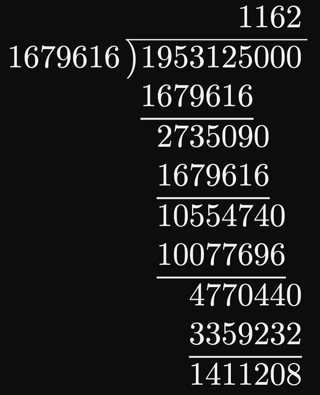Starting with the claim
$$ 4^{5^9} > 5^{6^8} $$
We have
$$ \iff 5^9\ln4 > 6^8\ln5 $$
$$ \iff \frac{5^9}{6^8} > \frac{\ln5}{\ln4} $$
$$ \iff 5\times\left(\frac56\right)^8 > \frac{\ln5}{\ln4} $$
$$ \iff \ln5+8\ln\frac56 > \ln\frac{\ln5}{\ln4} $$
Using $\ln x = - \ln(1/x)$, we can define a quantity $A$:
$$ \iff A:= \frac{\ln5 - \ln\frac{\ln5}{\ln4}}{\ln\frac65} > 8 $$
Using the hints we have the bounds
$$ 0.69305 < \ln(2) < 0.69315$$
$$ 1.09855 < \ln(3) < 1.09865$$
$$ 1.60935 < \ln(5) < 1.60945$$
Since we want to prove that $A>8$, we have to try to make it smaller using our bounds while still having the result be larger than $8$.
For the first term in the numerator, if we make it smaller, then $A$ will get smaller, so we need $$\ln(5) > 1.60935.$$
For the second term in the numerator, if we make it bigger, then $A$ will get smaller, so we can first do longhand division to get $$ \frac{\ln5}{\ln4} = \frac{\ln5}{2\times\ln2}< \frac{1.60945}{2\times 0.69305} < 1.1612 $$ (the given hint only upper bounds it by 1.1615 which will not be good enough), then put this in the series to compute $$\ln\frac{\ln5}{\ln4} < \ln 1.1612 < 0.1612 - \frac{0.1612^2}{2} + \frac{0.1612^3}{3}$$ (it is an upper bound since we have just added a positive term, the cubed term, to an alternating series).
We can get an upper bound on this by only ever keeping 4 decimal places. Let $x=0.1612$ then compute $0.0258 < x^2 < 0.0260$. Use the upper bound for $x^2$ to compute $x^3 < 0.0260x < 0.0042$, so this is $$<0.1612 - 0.0129 + 0.0014 = 0.1497$$
For the denominator, if we make it bigger, then $A$ will get smaller, so we need $$ \ln(6/5) = \ln2 + \ln3 - \ln5 < 0.69315 + 1.09865 - 1.60935 = 0.18245 $$
we get that the claim
$$ \iff \frac{\ln5 - \ln\frac{\ln5}{\ln4}}{\ln(6/5)} > \frac{1.60935 - 0.1497}{0.18245} = 8 + \frac{1}{3649}> 8$$
which is true

